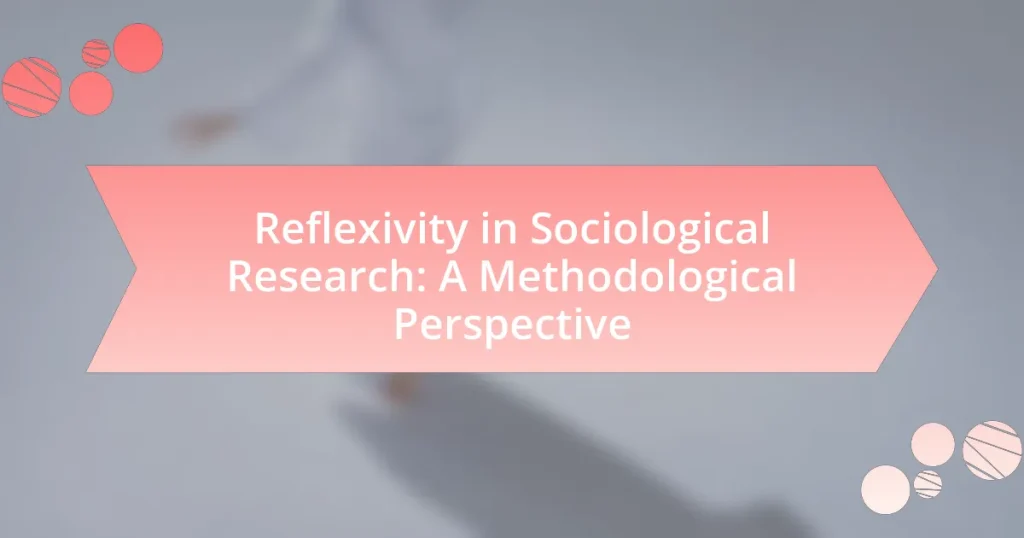Reflexivity in sociological research is the critical examination of how researchers’ personal biases, perspectives, and social positions influence the research process and outcomes. This article explores the significance of reflexivity in enhancing the credibility and validity of research findings, emphasizing its role in qualitative methodologies such as ethnography and narrative analysis. Key concepts discussed include self-awareness, positionality, and the interaction between subjectivity and objectivity, alongside the ethical implications of reflexivity. The article also addresses challenges in implementing reflexivity in quantitative research and offers best practices for researchers to ensure transparency and mitigate biases, ultimately contributing to richer data interpretation and more reliable sociological insights.

What is Reflexivity in Sociological Research?
Reflexivity in sociological research refers to the process by which researchers critically examine their own influence on the research process and outcomes. This concept emphasizes the importance of acknowledging how personal biases, perspectives, and social positions can shape the interpretation of data and the interactions with participants. Reflexivity is essential for enhancing the credibility and validity of research findings, as it encourages researchers to reflect on their roles and the potential impact of their presence in the field.
Why is reflexivity important in sociological research?
Reflexivity is important in sociological research because it allows researchers to critically examine their own biases, assumptions, and influences on the research process. This self-awareness enhances the validity and reliability of findings by acknowledging how the researcher’s perspective can shape data interpretation. For instance, studies like “Reflexivity in Qualitative Research” by Finlay (2002) highlight that reflexivity can lead to more nuanced insights and a deeper understanding of social phenomena, ultimately improving the quality of sociological inquiry.
How does reflexivity influence research outcomes?
Reflexivity significantly influences research outcomes by prompting researchers to critically examine their own biases, assumptions, and the impact of their positionality on the research process. This self-awareness can lead to more nuanced interpretations of data and a deeper understanding of the social contexts being studied. For instance, a study by Finlay (2002) in “Reflexivity: An Essential Tool for All Research?” highlights that reflexive practices can enhance the credibility and validity of qualitative research by ensuring that researchers acknowledge their influence on the research setting and findings. By integrating reflexivity, researchers can produce more reliable and contextually relevant outcomes, ultimately enriching the quality of sociological research.
What are the ethical implications of reflexivity?
The ethical implications of reflexivity in sociological research include the responsibility of researchers to acknowledge their own biases and the influence of their perspectives on the research process. Reflexivity requires researchers to critically examine how their identities, experiences, and positions affect data collection, interpretation, and representation. This self-awareness can lead to more ethical research practices by promoting transparency and accountability, thereby reducing the risk of misrepresentation or exploitation of participants. For instance, studies have shown that reflexive practices can enhance the validity of qualitative research by ensuring that researchers remain aware of their impact on the research context, as highlighted in the work of Finlay (2002) in “Negotiating the Self in Qualitative Research.”
What are the key concepts related to reflexivity?
Key concepts related to reflexivity include self-awareness, positionality, and the impact of the researcher on the research process. Self-awareness refers to the researcher’s understanding of their own biases and perspectives, which can influence data interpretation. Positionality involves recognizing how the researcher’s social identity, including factors like race, gender, and class, shapes their interactions with participants and the research context. The impact of the researcher on the research process highlights how the researcher’s presence and actions can affect the outcomes of the study, emphasizing the need for critical reflection throughout the research. These concepts are essential for ensuring rigor and credibility in sociological research.
How do subjectivity and objectivity interact in reflexive research?
Subjectivity and objectivity interact in reflexive research by creating a dynamic interplay that enhances the understanding of social phenomena. Reflexive research acknowledges that researchers’ subjective experiences and perspectives influence their interpretations, while simultaneously striving for objective analysis through systematic methodologies. This interaction allows researchers to critically examine their biases and assumptions, leading to more nuanced insights. For instance, in qualitative studies, the researcher’s reflections on their positionality can illuminate how personal experiences shape data interpretation, thereby enriching the research findings. This dual focus on subjectivity and objectivity is essential for producing credible and comprehensive sociological insights.
What role does researcher bias play in reflexivity?
Researcher bias significantly influences reflexivity by shaping how researchers interpret data and reflect on their positionality. This bias can lead to selective attention to certain findings while disregarding others, ultimately affecting the validity of the research outcomes. For instance, a study by Finlay (2002) highlights that researchers must acknowledge their biases to enhance reflexivity, as unexamined biases can distort the research process and findings. By actively engaging in reflexivity, researchers can critically assess their biases, leading to more nuanced and credible interpretations of their work.

How is Reflexivity Applied in Sociological Research Methodology?
Reflexivity is applied in sociological research methodology by encouraging researchers to critically examine their own biases, assumptions, and the impact of their presence on the research process. This self-awareness helps to enhance the validity and reliability of the findings by acknowledging how the researcher’s background, perspectives, and interactions with participants can shape the data collected. For instance, in qualitative studies, reflexivity can involve maintaining a reflexive journal where researchers document their thoughts and feelings throughout the research process, allowing for a more nuanced understanding of how their subjectivity influences the research outcomes. This practice is supported by scholars like Bourdieu, who emphasized the importance of reflexivity in understanding the social world, thereby reinforcing the credibility of sociological research.
What methodologies incorporate reflexivity?
Methodologies that incorporate reflexivity include qualitative research methods such as ethnography, grounded theory, and narrative analysis. These methodologies emphasize the researcher’s awareness of their influence on the research process and findings. For instance, ethnography requires researchers to reflect on their positionality and biases while engaging with participants, which can shape the data collected. Grounded theory involves iterative data collection and analysis, prompting researchers to continuously reflect on their interpretations and assumptions. Narrative analysis focuses on the stories told by participants, necessitating reflexive consideration of how the researcher’s perspective may affect the narrative construction.
How does qualitative research benefit from reflexivity?
Qualitative research benefits from reflexivity by enhancing the credibility and depth of findings. Reflexivity allows researchers to critically examine their own biases, perspectives, and influence on the research process, which leads to more nuanced interpretations of data. For instance, by acknowledging their positionality, researchers can better understand how their backgrounds shape interactions with participants and the data collected. This self-awareness fosters transparency, ultimately improving the trustworthiness of qualitative research outcomes.
What are the challenges of implementing reflexivity in quantitative research?
Implementing reflexivity in quantitative research presents several challenges, primarily due to the inherent nature of quantitative methods that prioritize objectivity and statistical analysis. One significant challenge is the difficulty in integrating subjective insights and personal biases into a framework that traditionally relies on numerical data and empirical evidence. This tension can lead to a lack of transparency regarding the researcher’s influence on the research process and outcomes.
Additionally, quantitative research often employs standardized instruments and protocols, which can limit the flexibility needed for reflexive practices. For instance, the use of fixed-response surveys may not allow researchers to capture the nuanced perspectives that reflexivity aims to address. Furthermore, the emphasis on replicability in quantitative studies can discourage researchers from acknowledging their positionality, as doing so may be perceived as compromising the study’s validity.
These challenges highlight the need for methodological adaptations that can accommodate reflexivity while maintaining the rigor of quantitative research.
How can researchers practice reflexivity effectively?
Researchers can practice reflexivity effectively by engaging in continuous self-reflection and critically examining their own biases, assumptions, and influences on the research process. This involves maintaining a reflexive journal to document thoughts and feelings throughout the research, which helps in recognizing how personal experiences shape interpretations. Studies, such as those by Finlay (2002) in “Negotiating the Self in Qualitative Research,” emphasize that reflexivity enhances the credibility of research findings by making the researcher’s positionality transparent. By systematically analyzing their role and its impact on the research, researchers can produce more nuanced and reliable insights.
What techniques can enhance reflexive practice?
Techniques that can enhance reflexive practice include journaling, peer feedback, and critical self-reflection. Journaling allows researchers to document their thoughts and feelings throughout the research process, fostering greater self-awareness and insight into their biases. Peer feedback provides an external perspective, enabling researchers to identify blind spots and assumptions that may influence their work. Critical self-reflection encourages individuals to analyze their motivations, values, and the impact of their positionality on the research outcomes. These techniques are supported by studies indicating that reflexive practices improve the quality and credibility of sociological research by promoting transparency and ethical considerations.
How can researchers document their reflexive processes?
Researchers can document their reflexive processes by maintaining detailed field notes, reflective journals, and audio or video recordings of their thoughts and interactions during the research process. These methods allow researchers to capture their evolving perspectives, biases, and emotional responses, which are critical for understanding how their subjectivity influences the research outcomes. For instance, reflective journals have been shown to enhance self-awareness and critical thinking, as evidenced by studies indicating that regular reflection can lead to deeper insights into the researcher’s positionality and its impact on data interpretation.

What are the Implications of Reflexivity for Sociological Research Findings?
Reflexivity significantly impacts sociological research findings by influencing how researchers interpret data and understand their positionality within the research context. This self-awareness allows researchers to recognize biases and assumptions that may shape their findings, leading to more nuanced and credible interpretations. For instance, studies such as “Reflexivity in Qualitative Research” by Finlay (2002) highlight that acknowledging one’s influence can enhance the validity of qualitative data by fostering transparency in the research process. Consequently, reflexivity not only enriches the analysis but also encourages ethical considerations in sociological research, ultimately contributing to more reliable and comprehensive findings.
How does reflexivity affect the validity of research findings?
Reflexivity significantly enhances the validity of research findings by encouraging researchers to critically examine their own biases, assumptions, and influences on the research process. This self-awareness allows for a more nuanced understanding of how these factors may shape data collection, analysis, and interpretation. For instance, a study by Finlay (2002) in “Qualitative Research in Psychology” emphasizes that reflexivity can lead to richer insights and more credible conclusions, as it prompts researchers to acknowledge their positionality and its impact on the research context. By integrating reflexivity into the research methodology, scholars can mitigate potential biases, thereby strengthening the overall validity of their findings.
What are the potential biases introduced by reflexivity?
Reflexivity can introduce several potential biases in sociological research, primarily through the researcher’s influence on data interpretation and participant interactions. These biases include confirmation bias, where researchers may favor information that aligns with their pre-existing beliefs, and social desirability bias, where participants may alter their responses based on perceived expectations from the researcher. Additionally, reflexivity can lead to over-identification with participants, skewing the researcher’s perspective and potentially distorting findings. Studies have shown that reflexive practices can affect the validity of qualitative data, as highlighted in the work of Finlay (2002), which emphasizes the need for critical self-awareness to mitigate these biases.
How can reflexivity contribute to richer data interpretation?
Reflexivity enhances data interpretation by allowing researchers to critically examine their own biases, perspectives, and influences on the research process. This self-awareness leads to a more nuanced understanding of the data, as researchers can identify how their positionality shapes the interpretation of findings. For instance, a study by Finlay (2002) in “Negotiating the Self: Reflexivity in Qualitative Research” demonstrates that reflexive practices can reveal underlying assumptions and contextual factors that affect data analysis, ultimately leading to richer, more comprehensive insights.
What best practices should researchers follow regarding reflexivity?
Researchers should engage in continuous self-reflection to understand their biases and influence on the research process. This practice involves regularly examining their assumptions, values, and experiences that may shape their interpretations and interactions within the research context. For instance, documenting personal reflections throughout the research process can help identify potential biases, as highlighted in the work of Finlay (2002), who emphasizes the importance of reflexivity in qualitative research to enhance credibility and rigor. Additionally, seeking feedback from peers and participants can provide diverse perspectives, further enriching the reflexive process.
How can researchers ensure transparency in their reflexive practices?
Researchers can ensure transparency in their reflexive practices by systematically documenting their decision-making processes and personal biases throughout the research. This involves maintaining detailed field notes, reflecting on their positionality, and openly discussing how their backgrounds and experiences may influence the research outcomes. Studies, such as those by Finlay (2002) in “Negotiating the Self: Reflexivity in Qualitative Research,” emphasize that transparency is achieved through explicit acknowledgment of the researcher’s role and the impact of their perspectives on data interpretation. By doing so, researchers provide a clearer understanding of the research context, enhancing the credibility and trustworthiness of their findings.
What common pitfalls should researchers avoid when applying reflexivity?
Researchers should avoid the pitfalls of superficial self-reflection, overemphasis on personal bias, and neglecting the impact of their positionality when applying reflexivity. Superficial self-reflection can lead to a lack of depth in understanding how personal experiences shape research outcomes, which diminishes the quality of the analysis. Overemphasis on personal bias may result in researchers becoming overly critical of their perspectives, potentially leading to paralysis in decision-making or an incomplete understanding of the research context. Neglecting the impact of positionality can cause researchers to overlook how their social identities influence interactions with participants and the interpretation of data, ultimately affecting the validity of their findings. These pitfalls can compromise the integrity and rigor of sociological research.
